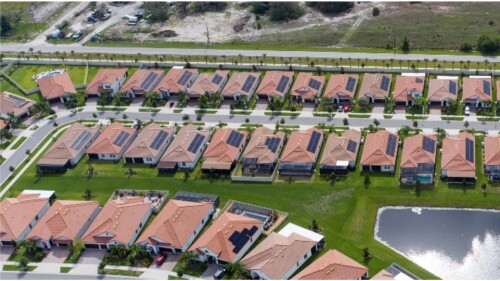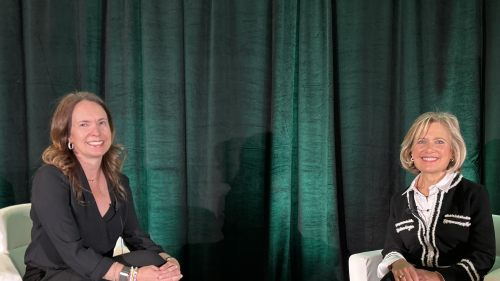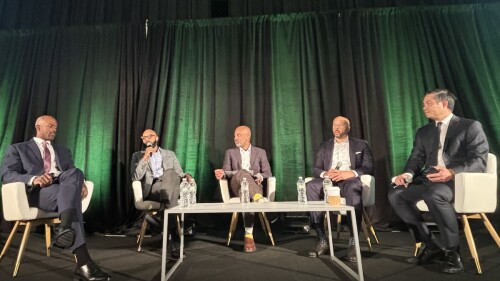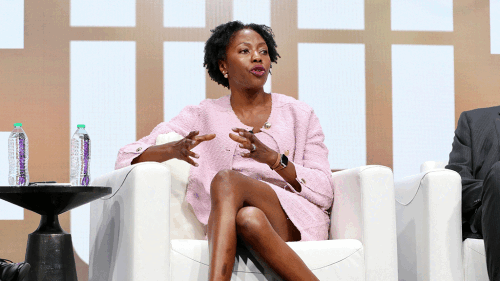With the memory of lower Manhattan darkened by Superstorm Sandy still fresh, cities see a new urgency in sustainability. Given the political environment in the U.S. Congress, they are also largely on their own in the short term.
At the second New York Times Energy for Tomorrow conference, titled “Building Sustainable Cities,” panels covering topics ranging from self-driving cars to clean-tech investing in China were hosted by Times columnists, including Thomas Friedman, Andrew Ross Sorkin, Joe Nocera, and Bill Keller.
Michael R. Bloomberg, mayor of New York City, told those gathered for the conference that he sees cities as a catalyst for progress and innovation. “All the progress that is being made in this country and really around the world is not made by the federal government. It’s not the state government,” said Bloomberg. “It has been made by cities that are actually leading the way on climate change; leading the way on crime and gun reduction; leading the way on immigration reform, to the extent they can without national laws; leading the way on education.”
Bloomberg reminded the audience how unpopular policies like banning smoking were at first but that are now commonplace. He said painting roofs white and other “green” tactics are becoming the norm.
Other themes of the conference included:
Cities Learning from Each Other: Bike sharing was one example of the programs that are spreading from city to city, according to Walter Hook, CEO of the Institute for Transportation and Development Policy. Bloomberg also noted in his remarks that, through the C-40 Cities Climate Leadership Group, Chinese cities are starting to send representatives to learn from what is being done on sustainability in Europe, North America, and elsewhere. Shaun Donovan, secretary of the U.S. Department of Housing and Urban Development, said “every mayor wants a High Line,” referring to the elevated rail line converted to park space on Manhattan’s lower west side.
What Role for Cars? Jamie Lerner, former mayor of Curitiba, Brazil, said he thinks car driving will be the cigarette smoking of the future. On a different panel, Hook, a transportation expert, said he expects San Francisco’s success with performance parking—charging more for parking in desirable locations at desirable times—to make that approach the new normal. Though there is no plan to introduce congestion pricing in New York City, the city is experimenting with a pilot program called PARK Smart, in which prices at meters vary depending on the time of day, as well as with bike lanes and bike sharing, which is expected to be launched this month. According to Janette Sadik-Khan, the city’s transportation commissioner, New York City is also improving bus service.
Reducing Waste: Actor Jeremy Irons, an executive producer of the documentary Trashed, said people need to stop incinerating their trash because it releases a variety of toxins into the atmosphere and water supply. But Sabine Froning, CEO of Euroheat, said incineration is a viable way to generate clean energy. In his comments, Bloomberg said 100 local restaurants have pledged to reduce by 50 percent their output of food waste, which accounts for one-third of the city’s 20,000 tons of daily refuse.
Localism/Urban Farms: Greg Stanton, mayor of Phoenix, said his city is using vacant properties for parks and urban gardens. This was echoed on another panel by Will Allen, whose Milwaukee-based Growing Power group works with cities to create urban farms. But Dan Barber of the U.S. Council on Fitness, Sports, and Nutrition was skeptical that the United States will be able to obtain all its food cheaply and from local sources.
China’s Future: The view of China’s urban evolution was mixed. William McDonough, an architect and chairman of McDonough Advisors, is working with cities in China as a venture capitalist on clean tech to alleviate urban pollution. But Hal Harvey, CEO of Energy Innovation: Policy and Technology LLC, said China is duplicating many of the West’s mistakes when it comes to urban planning.
Streaming video of all the panels is available at nytenergyfortomorrow.com.





